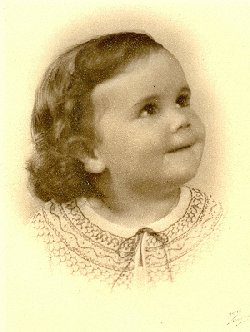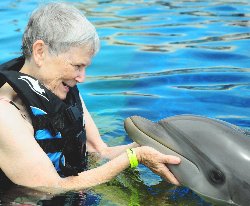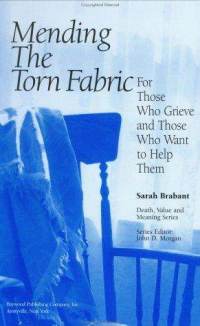SARAH BRABANT - NOTED WRITER/EXPERT ON GRIEF MANAGING
FEMINIST/COMMUNITY ACTIVIST  I was born in LaGrange Georgia
(November 18, 1932) into a deeply bereaved family. In 1929 my mother's beloved aunt died during surgery following
a car accident and her father died from suicide two weeks later. In 1931 my sister died from cancer of the liver
the day before her second birthday. I was born the next year. Death and grief were central to my life. As a child
I spent a lot of time visiting the cemetery with my mother. She made certain that holidays were festive occasions.
I have few other memories of her. For the most part I was raised by caring African American women who were strong
women and became my role models. I also spent a lot of time riding with my father (Enoch Callaway, a pioneer oncologist)
as he made house calls to his cancer patients. When I was in my early teens I started working with him at his cancer
clinic. My childhood was quite different than that of my friends, but it afforded me experiences for which I will
always be grateful. I was born in LaGrange Georgia
(November 18, 1932) into a deeply bereaved family. In 1929 my mother's beloved aunt died during surgery following
a car accident and her father died from suicide two weeks later. In 1931 my sister died from cancer of the liver
the day before her second birthday. I was born the next year. Death and grief were central to my life. As a child
I spent a lot of time visiting the cemetery with my mother. She made certain that holidays were festive occasions.
I have few other memories of her. For the most part I was raised by caring African American women who were strong
women and became my role models. I also spent a lot of time riding with my father (Enoch Callaway, a pioneer oncologist)
as he made house calls to his cancer patients. When I was in my early teens I started working with him at his cancer
clinic. My childhood was quite different than that of my friends, but it afforded me experiences for which I will
always be grateful.As a child I questioned many things that my friends took for granted. My father taught me to question racial inequality. I learned about gender inequality on my own in church. I wanted to carry the cross, not just sing, but was told by my priest that it was too heavy for me. I practiced on my own and one day showed him that I could do quite well. It was then that I learned there was another reason; I was a girl. I never seemed to fit in. I thought my marriage in 1953 would be the answer. I would be a wife and mother; life would be simple. By 1962, however, it was obvious that my husband, a bi-polar, could not support me and my three children. To gain earning power, I entered Memphis State University in Tennessee. Four years later I completed the bachelor's degree program that I had abandoned when I got married. I wanted to continue to work on a master's degree in social work but a woman with three children was persona non grata at that time. I scored well on the Graduate Record Exam, however, and a new graduate program in sociology at Memphis State was happy to have me even if I was a "non traditional" student. Upon graduation I was offered an instructorship. The highs and lows of living with a manic depressive husband and the accompanying physical and emotional abuse continued. After years of hoping he would change or someone would rescue me, I decided to get a divorce. I thought my married life was hell; I was to enter a new hell-the legal system. Space does not allow me to tell all my story. It is sufficient to say that my father was dead, my husband was from a prominent family, his cousin was a senior partner in the most prestigious law firm in the city, and my lawyer had been selected by them. Yes, I was that naïve. After a brutal legal battle, I finally received a divorce at the cost of accepting the minimum child support possible. I was far from free, however. My former husband tried to get me fired, stalked me, at one time attempted to car-jack me, and set fire to my house.  My department head urged me to continue my education and I applied and received a National Defense Education Act Fellowship from the University of Georgia, one of the first women to do so. My ex-husband's lawyers took me to court to prevent me from moving. Their argument was that I already made more than a secretary. Why would I want to take my children away from their "loving" father"? How I managed to get permission to leave is a story in itself. Suffice it to say that I played the role of the helpless woman longing to be nearer her mother. My ex-husband's failure to pay even the minimal child support was never mentioned at the hearing. My attorney did not want to bring it up since it "might complicate things." At Georgia I became acquainted with the feminist movement through a fellow student,, Shirlee Owens, and joined NOW. I believe it was Robin Morgan who said that feminism was another name for a scream. I had needed to scream for a long time. At last I had permission to do so. I received my doctorate in 1973. To this day I say that I owe my Ph.D. to my first husband who called me "stupid" and "pea brain" one time too often. Affirmative action resulted in my receiving quite a few job offers but the University of Louisiana at Lafayette (then the University of Southwestern Louisiana) was the only one that wanted me because of my credentials not my gender. It was a great place for me. First, it offered Wilmer MacNair, one of my former professors and soon-to-be husband, and me the opportunity to be employed at the same university in the same department. This was almost unheard of at that time. Secondly, I was able to engage in my three loves: teaching, research, and community activism. Finally, the feminist movement was alive and well in the area. Louisiana was a pivotal state in the fight for the Equal Rights Amendment. I was privileged to meet courageous activists for women's rights, e.g., such women as Ollie Osborne, Fran Bussie, Pat Evans, and Sylvia Roberts. There was even a local chapter of NOW. I went to a few meetings, but found that the members wanted a place to scream. I was glad they had the opportunity but I was done screaming. I wanted to do something. My course assignments included Marriage and the Family and Social Problems as well as Introductory Sociology, areas I found fascinating. My research at that time focused on gender studies. My articles appear in several issues of Sex Roles, as well as the American Journal of Orthopsychiatry, Sociology and Social Research, Sociological Spectrum, Wisconsin Sociologists, Free Inquiry, and the Journal of College Student Personnel. It was interesting research, but the opportunity to work with a colleague on oil and gas impact grants paid and enabled me to put my three children through college. Articles in the Journal of Applied Sociology, Sociological Perspectives, and Impact Assessment not only added to my resume but were far more valued by my university than "women's journals. I was deteremined to climb the academic ladder to the top. Even more important, however, was my goal to reach out to women who were going through what I had been through. I found other women who shared this goal: Jessie Taylor, Isabel Gant, Doris Bentley and Margaret Gimbrede. Taylor and Gant worked for the city, Bentley was a colleague at the university, and Gimbrede was active in both the Association of University Women and the League of Women Voters. Two of us were African American; three were white. Together we proved to be a formidable force. We founded the Mayor's Commission on the Needs of Women and designed and developed both the first battered women's shelter and the first rape crisis center in the area. The oil boom had turned to a bust and I was privileged to serve as president of the Board of Faith House, a shelter for homeless women. I taught about sexism (and racism) in my classroom. I was asked to present workshops on gender issues in the community. The prevailing literature on why women remained in battering situations or got raped (masochism and sadism) infuriated me for it revictimized the victim. My search for a better model led me to the emerging death, dying and bereavement literature and the models of loss. My mother's death in 1980 prompted me to offer a one-time seminar in Death and Dying. Three years later I was asked by students to repeat the seminar and in 1985, again at student request, the course became part of the regular curriculum. I had come full circle. I taught this course as part of my course load each semester until I retired as Professor Emeritus in 2001. I continued to teach it as an adjunct until 2006.  As a result of this course my community involvement shifted from programs for raped, battered, and homeless women to death and grief related programs. I have served as a support person for Compassionate Friends, Acadiana Chapter since 1983, counseled Persons Living with AIDS through Acadiana CARES since 1988 and was appointed to the faculty of the Delta Region AIDS Education and Training Center in 1990. I was one of the founders and also served on the Board of Directors of The Grief Center of Southwest Louisiana (now Healing House), a local program for bereaved children and their care givers. My research interests changed as well. My publications on death and grief related issues appear in Omega, The Hospice Journal, Association of Death, Education, and Counseling Forum, Illness, Crisis & Loss, Teaching Sociology, International Journal of Addictions, Death Studies, Clinical Sociology Review, AIDS Patient Care, and Journal of Gerontological Social Work as well as a number of chapters in edited books. In 1996 I wrote Mending the Torn Fabric: For Those Who Grieve and Those Who Want to Help Them and have presented numerous papers, workshops, and lectures on death and bereavement related issues at the local, state, and national level. At 78, I am still engaged in research and community activism, e.g., developing programs for low-income women. My husband of thirty-seven years has long been a member of NOW; my son and daughter-in-law are both pro women's rights. All three have supported my activism. At some level my two daughters have resented my social activism. I regret that I was not the stay-at-home mother they seem to have wanted me to be. I did not have that choice. Regardless, I would not change my life, neither the bad times, nor the good ones. I am who I am today because of all my experiences. I still don't "fit in," but I like being who I am. Contact Sarah Brabant: sbrabant@bellsouth.net Comments: Jacqui Ceballos jcvfa@aol.com Back to VFA Fabulous Feminists Table of Contents |